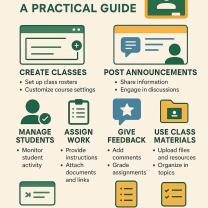What can you expect from online college classes?
Expectations from online college classes can vary based on the institution, the specific course, and the instructor. However, there are certain common aspects and considerations that can provide insights into what you can generally expect from online college classes:
1. Flexibility:
- Pros: Online classes offer flexibility in terms of when and where you can access course materials. This flexibility is beneficial for students with busy schedules or other commitments.
- Cons: While flexibility is a significant advantage, it also requires strong self-discipline and time management skills to stay on track with assignments and deadlines.
2. Virtual Learning Environment:
- Pros: You will use a virtual learning environment (VLE) or learning management system (LMS) to access course materials, assignments, and communication tools. This centralized platform helps organize your coursework.
- Cons: Technical issues can sometimes arise, so having a reliable internet connection and understanding the technology requirements are crucial.
3. Communication Tools:
- Pros: Online classes often include communication tools such as discussion forums, email, and virtual meetings. These tools facilitate interaction with instructors and classmates.
- Cons: Building relationships and engaging in discussions may require extra effort compared to face-to-face classes.
4. Self-Paced Learning:
- Pros: Some online classes are self-paced, allowing you to progress through the material at your own speed. This can be advantageous for independent learners.
- Cons: Self-paced learning requires discipline, and procrastination can be a challenge. Staying motivated and keeping up with assignments is essential.
5. Assessment Methods:
- Pros: Assessments may include quizzes, assignments, discussion participation, and exams. Some classes may use a variety of assessment methods to gauge your understanding.
- Cons: Exams may be proctored, and technical issues during assessments could be a concern. Understanding the assessment methods in advance is important.
6. Instructor Support:
- Pros: Instructors are typically accessible through email, virtual office hours, and discussion forums. They provide guidance, feedback on assignments, and answer questions.
- Cons: Response times may vary, and building a rapport with instructors may require proactive communication.
7. Resources and Materials:
- Pros: Course materials, readings, and resources are often available online. This accessibility can enhance your learning experience.
- Cons: Reliable access to required textbooks, software, or other resources is essential. Availability of resources may vary.
8. Group Projects and Collaboration:
- Pros: Collaborative activities, group projects, and virtual teamwork are common components. These experiences simulate real-world collaboration.
- Cons: Scheduling group work may be challenging due to different time zones or conflicting schedules. Effective communication is crucial for successful collaboration.
9. Technical Requirements:
- Pros: Online classes typically require standard technology such as a computer, internet access, and possibly specific software. These requirements are usually outlined in the course syllabus.
- Cons: Technical issues may occur, so being prepared and having contingency plans can help mitigate challenges.
10. Access to Recorded Lectures:
- Pros: Many online classes provide recorded lectures or video content that you can review at your convenience. This can be beneficial for reinforcing concepts.
- Cons: Missing live sessions may reduce opportunities for real-time interaction and engagement.
11. Grading and Feedback:
- Pros: Grades and feedback on assignments are typically provided electronically. The transparency of the grading process can contribute to a clear understanding of your performance.
- Cons: Clarifying feedback or discussing grades may require additional communication with instructors.
12. Proctored Exams:
- Pros: Some online classes may have proctored exams to ensure academic integrity. Proctoring methods can include virtual proctors or testing centers.
- Cons: Understanding the proctoring process, technical requirements, and any associated costs is important.
13. Accessibility and Inclusivity:
- Pros: Online classes can be more accessible to students with diverse needs, allowing for a more inclusive learning environment.
- Cons: Ensuring that course materials and activities are accessible to all students may require additional considerations.
14. Networking Opportunities:
- Pros: Some online classes offer networking opportunities through virtual events, discussion forums, or collaborative projects.
- Cons: Building a network may require proactive engagement, as the absence of face-to-face interactions can make networking less spontaneous.
15. Library and Research Resources:
- Pros: Access to online libraries, databases, and research resources can enhance your ability to conduct research for assignments.
- Cons: Familiarizing yourself with online research tools and understanding the availability of resources is important.
16. Time Commitment:
- Pros: Online classes can be more accommodating for students who work part-time or have other commitments. You can often balance work and studies more effectively.
- Cons: Balancing multiple responsibilities requires effective time management to avoid falling behind.
17. Discussion and Interaction:
- Pros: Online classes include discussion forums and virtual interactions that facilitate engagement with course content and peers.
- Cons: Active participation in discussions may be necessary to feel fully connected to the learning community.
18. Costs and Financial Considerations:
- Pros: Online classes may offer cost savings related to commuting, housing, and other expenses associated with on-campus attendance.
- Cons: Some online courses may have additional fees, and financial aid policies may vary.
19. Real-World Application:
- Pros: Many online classes incorporate real-world applications and case studies, connecting theoretical concepts to practical scenarios.
- Cons: The absence of in-person experiences may require additional effort to relate course content to real-world contexts.
20. Student Support Services:
- Pros: Online students often have access to support services such as tutoring, counseling, and academic advising.
- Cons: Initiating contact with support services may require proactive outreach.
In summary, while online college classes offer flexibility and accessibility, success in online learning requires self-discipline, effective time management, and proactive engagement. Understanding the specific expectations, communication channels, and support services available in your online classes will contribute to a positive learning experience.
Common Features and Elements in Online College Classes:
Despite variations in format and delivery, many common features and elements characterize online college classes:
- Learning Management System (LMS): Online platforms like Canvas, Blackboard, or Moodle serve as the central hub for accessing course materials, assignments, discussions, grades, and communication tools.
- Course Modules: Content is organized into structured modules with readings, lectures (text, video, or audio), interactive exercises, quizzes, and assignments.
- Asynchronous Learning: Most online classes adopt an asynchronous format, allowing students to access materials and complete assignments at their own pace and schedule.
- Discussion Forums: Online forums facilitate communication and collaboration between students and instructors. Students can ask questions, share ideas, and participate in discussions asynchronously.
- Virtual Office Hours: Instructors often hold virtual office hours using platforms like Zoom or Skype, providing opportunities for individual consultations and discussion.
- Assessments and Feedback: Online courses utilize various assessment methods, including quizzes, exams, essays, projects, and presentations. Instructors provide feedback through LMS tools, email, or written comments.
- Digital Resources: Online libraries, databases, and other digital resources provide access to academic materials and research tools.
- Collaborative Tools: Some online courses incorporate collaborative tools like wikis, group chats, or video conferencing platforms to facilitate teamwork on projects and assignments.
Online Interaction and Collaboration:
Online interaction and collaboration occur through various methods in online college classes:
- Discussion Forums: Students engage in asynchronous discussions on topics related to the course material, share perspectives, and learn from each other.
- Group Projects: Collaborative projects encourage teamwork, communication, and problem-solving skills. Online tools like Google Docs or shared workspaces facilitate collaboration.
- Virtual Meetings and Chats: Synchronous sessions using Zoom, Skype, or other platforms allow for real-time interaction, discussions, and presentations.
- Peer Review and Feedback: Students can provide feedback on each other's work through online platforms, fostering critical thinking and communication skills.
- Social Media Groups: Some courses utilize social media platforms like Facebook or Twitter for informal discussions, sharing resources, and building a sense of community.
Support Resources for Online Students:
To ensure student success, online colleges offer various support resources:
- Academic Support: Online tutoring, writing centers, and academic skills workshops are available to help students with specific subjects, writing assignments, and time management.
- Technical Support: Dedicated technical support teams assist students with troubleshooting technical issues and navigating the online learning platform.
- Library Services: Online libraries provide access to academic databases, ebooks, journals, and research assistance via librarians.
- Disability Services: Support services are available for students with disabilities to ensure equal access to educational resources and accommodations.
- Counseling and Wellness Services: Online counseling services offer mental health support and guidance for navigating the challenges of online learning.
- Student Success Advisors: Academic advisors provide guidance in selecting courses, achieving academic goals, and navigating university policies.
By utilizing these resources, students can overcome challenges, enhance their learning, and build a successful online learning experience.











